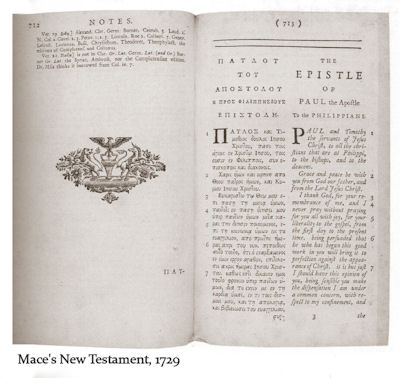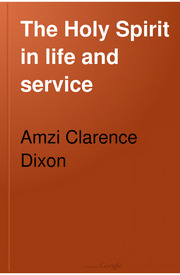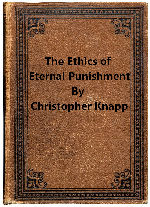Mace’s New Testament, 1729
[Daniel Mace], The New Testament in Greek and English, Containing the Original Text Corrected from the Authority of the most Authentic Manuscripts: And a New Version Form’d agreeably to the Illustrations of the Most Learned Commentators and Critics: with Notes and Various Readings, and a Copious Alphabetical Index. 2 vols. London: for J. Roberts, 1729.
 Daniel Mace, a Presbyterian minister in Newbury, England, published this edition anonymously. It is a bilingual edition, Greek and English in parallel columns, with annotations.
Daniel Mace, a Presbyterian minister in Newbury, England, published this edition anonymously. It is a bilingual edition, Greek and English in parallel columns, with annotations.
The translation is often needlessly paraphrastic. In the first chapter of Romans, we find that in verses 1-2 the words ἀφωρισμένος εἰς εὐαγγέλιον θεοῦ, ὃ προεπηγγείλατο(set apart for the gospel of God, which he promised) is rendered “chosen to declare the gospel dispensation, which God had promised”; in verse 5 δι᾽ οὗ ἐλάβομεν χάριν καὶ ἀποστολὴν (through whom we have received grace and apostleship) is rendered “by whose favour I have received the office of an apostle”; in verse 13 καρπὸν τινὰ σχῶ (I might have some fruit) is rendered “I might be useful”; in verse 17 δικαιοσύνη γὰρ θεοῦ ἐν αὐτῷ ἀποκαλύπτεται ἐκ πίστεως εἰς πίστιν (for in it a righteousness of God is revealed from faith to faith) is rendered “There it is that divine justification is revealed to be wholly by faith”; in verse 21 ἐματαιώθησαν ἐν τοῖς διαλογισμοῖς αὐτῶν (they became vain in their reasonings) is rendered “their reasoning became extravagance”; and so forth.

Dixon The Holy Spirit in life and service is a 19 chapter work on the Holy Spirit and various of His relationships and how He works. Chapters on the Personality and Deity of the Holy Spirit, His relationship with young people, the Bible, Bible study, the Evangelist, the Sunday School Teacher, the Pastor, the Christian worker, the purity of the Mind, missions, Christ, etc.
PDF: Dixon The Holy Spirit in life and service
theWord: Dixon The Holy Spirit in life and service
MySword: Dixon The Holy Spirit in life and service
eSword: Dixon The Holy Spirit in life and service
In many places the meaning of the text is weakened by loose renderings. Romans 8:13, εἰ γὰρ κατὰ σάρκα ζῆτε, μέλλετε ἀποθνῄσκειν· εἰ δὲ πνεύματι τὰς πράξεις τοῦ σώματος θανατοῦτε, ζήσεσθε (for if ye live after the flesh, ye must die; but if by the spirit ye mortify the deeds of the body, ye shall live) becomes “for if you lead a sensual life, you will be miserable: but if through the spirit you mortify the affections of corrupted nature, you will be happy.” In some places he makes use of the paraphrastic method to force the text into line with currently popular ideas. We see the influence of eighteenth-century Arminianism in his rendering of Romans 9:18, where ὃν δὲ θέλει σκληρύνει (he hardeneth whomever he wills) is rendered “he … abandons others to their obduracy, according as he thinks fit.” In 9:22, σκεύη ὀργῆς κατηρτισμένα εἰς ἀπώλειαν (vessels of wrath fitted unto destruction) becomes “objects of his displeasure, that had been working out their own destruction.” The word χαρις is ordinarily rendered not “grace” but “favour,” evidently with the purpose of excluding the theological sense of divine influence which belongs to the word “grace,” which has no small importance in Refomed theology.
As the title indicates, the version is based upon a revised Greek text, “Corrected from the Authority of the most Authentic Manuscripts.” It has been said that this was the first English version to depart from the traditional Greek text (the Textus Receptus) where new information about manuscripts suggested that another reading might be more authentic. Actually, for a paraphrase like this one, which in so many places diverges significantly from any form of the Greek text, it makes no practical difference which variations of the Greek text it purports to represent. The alterations of the meaning arising from loose and faulty translation are much more significant than any variations to be found in the Greek copies. But after examining Mace’s Greek text separately, and judging it on its own merits, we must say that his revision of it was not very competently done. Although some of his alterations to the Received Text anticipated the results of later editors, many were very ill-founded, being capriciously chosen from the apparatus of Mill 1707 or made simply upon conjecture. For example, in Romans 5:12 it seems that ἐφ᾽ ᾧ πάντες ἥμαρτον (because all sinned) has been left out of the version without any manuscript authority for the omission. Likewise in Galatians 4:25, which Mace translates, “this Agar answers to the Jerusalem now in being, for she is in servitude with her children,” the words Σινᾶ ὄρος ἐστὶν ἐν τῇ Ἀραβίᾳ (is mount Sinai in Arabia) are omitted without any manuscript support.
Shortly after its appearance, Mace’s New Testament was the subject of a comprehensive refutation published by Leonard Twells, A Critical Examination of the late new Text and Version of the New Testament, wherein the Editor’s corrupt Text, false Version, and fallacious Notes, are Detected and Censured, in 3 volumes (London: R. Gosling, 1731-1732, reprinted in 1743). It was also castigated by eminent scholars (Michaelis among them), and was generally seen as an embarrassment to text-critical scholarship in England. In 1789 the Scottish scholar George Campbell wrote concerning Mace’s edition:
He has, along with his version, republished the Greek text, corrected, as he pretends, from authentic manuscripts. It does not, however, appear, that he has been guided by critical principles in judging of manuscripts, or of the preference due to particular readings. His chief rule seems to have been their conformity to his own notions, which has led him to employ a boldness in correcting altogether unwarrantable.
What follows may serve as evidence of this. Dr. Mill was so much pleased with a correction proposed by Bentley, as to say, “Mihi tantopere placet haec lectio, ut absque unanimi codicum in altera ista lectione consensu, genuinam eam intrepide pronunciarem:” to which our editor gives this brief and contemptuous reply,—“As if there was any manuscripts so old as common sense.” The greatest regard is doubtless due to common sense; but, where the subject is matter of fact, the proper province of common sense lies in comparing and judging the proofs brought before it, not in supplying from invention any deficiency in these. Common sense, or rather Reason is the judge in the trial. Manuscripts, versions, quotations, &c. are the testimonies. It would be a bad scheme in civil matters to supercede the examination of witnesses, on pretence that the sagacity of the judge rendered it unnecessary. Yet it might be pretended, that his penetration is such, that he can discover, at a glance, the truth, or the falsity, of the charge, from the bare physiognomy of the parties. But can you imagine, that people would think their lives, liberties, and properties, secure in a country, where this were the method of trial? Or will this method, think you, be found to answer better in critical, than in judicial matters? If, under the name of common sense, we substitute the critic’s fancy, in the room of testimony and all external evidence; we shall find, that we have established a test of criticism which is infinitely various, not in different sects only, but in different individuals. The common sense of the aforesaid English editor, and the common sense of Beza (yet neither of them was destitute of this quality,) would, I am afraid, have not very often coincided. 1
In 1854 Samuel P. Tregelles wrote:
… in 1729 Daniel Mace published his Greek Testament, with an English translation, in which he boldly and arbitrarily changed passages, with evidence or without it, in accordance with his own subjective notions. He was a man apparently of some ingenuity, of no real or accurate scholarship, and possessed of but little principle; he so contrived to use remarks in Mill’s Prolegomena, as to have apparently the sanction of the name of that critic for his mode of editing passages. In 1732 he was answered by Dr. Leonard Twells, whose work met with great approbation at the time: a fact which does not speak highly for the knowledge of criticism then commonly possessed. 2
For a more sympathetic evaluation of Mace, see H. McLachlan, “An Almost Forgotten Pioneer in New Testament Criticism,” Hibbert Journal, xxxvii (1938-9), pp. 617-25.
___________________________________________
1. George Campbell, The Four Gospels, translated from the Greek. With preliminary dissertations, and notes critical and explanatory. vol. 2 (London, 1789; American reprint in Boston by Bedlington and Ewer, 1824), pp. 401-2. See also Campbell’s remarks on the English style of the version on pp. 335ff.
2. Samuel P. Tregelles, An Account of the Printed Text of the Greek New Testament: with remarks on its revision upon critical principles: together with a collation of the critical texts of Griesbach, Scholz, Lachmann, and Tischendorf, with that in common use(London: Bagster, 1854), pp. 65-6.
Download
theWord.net: Daniel Mace New Testament (1729) (Mace)
More from this Category
- Stephanus Textus Receptus with interlinear, lemmas, accents, Strongs and Morphology 1.2
- Daniel Mace New Testament (1729) Es8
- Apostolic Bible Polyglot Greek-English Interlinear
- Apostolic Bible Polyglot Greek-English Interlinear
- Haweis Translation
- Apostolic Bible Polyglot Greek-English Interlinear
Advertisement

Knapp The Ethics of Eternal Punishment is a single chapter work on the everlasting or eternity of hell. Christopher Knapp is a brethren author.
PDF: Knapp The Ethics of Eternal Punishment
theWord: Knapp The Ethics of Eternal Punishment
MySword: Knapp The Ethics of Eternal Punishment
eSword: Knapp The Ethics of Eternal Punishment
